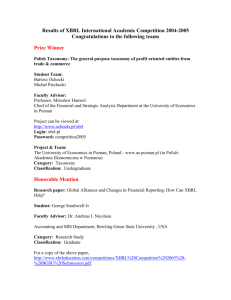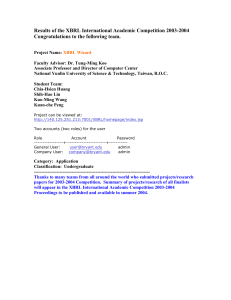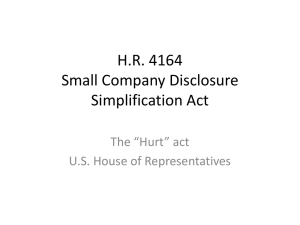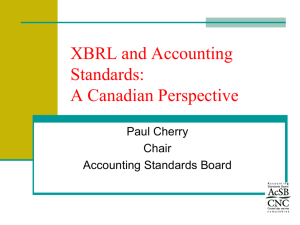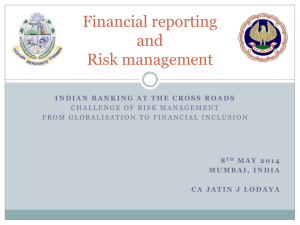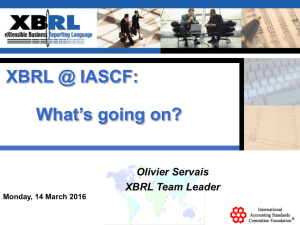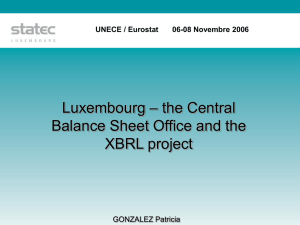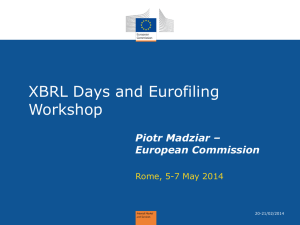Canada
advertisement
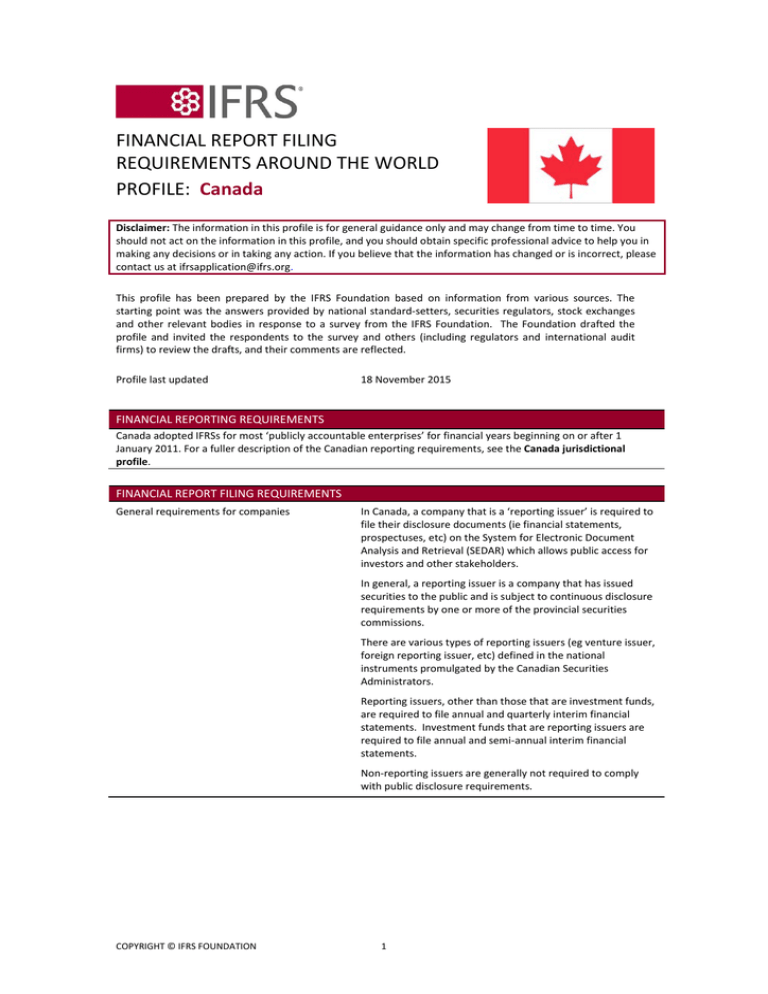
FINANCIAL REPORT FILING REQUIREMENTS AROUND THE WORLD PROFILE: Canada Disclaimer: The information in this profile is for general guidance only and may change from time to time. You should not act on the information in this profile, and you should obtain specific professional advice to help you in making any decisions or in taking any action. If you believe that the information has changed or is incorrect, please contact us at ifrsapplication@ifrs.org. This profile has been prepared by the IFRS Foundation based on information from various sources. The starting point was the answers provided by national standard-setters, securities regulators, stock exchanges and other relevant bodies in response to a survey from the IFRS Foundation. The Foundation drafted the profile and invited the respondents to the survey and others (including regulators and international audit firms) to review the drafts, and their comments are reflected. Profile last updated 18 November 2015 FINANCIAL REPORTING REQUIREMENTS Canada adopted IFRSs for most ‘publicly accountable enterprises’ for financial years beginning on or after 1 January 2011. For a fuller description of the Canadian reporting requirements, see the Canada jurisdictional profile. FINANCIAL REPORT FILING REQUIREMENTS General requirements for companies In Canada, a company that is a ‘reporting issuer’ is required to file their disclosure documents (ie financial statements, prospectuses, etc) on the System for Electronic Document Analysis and Retrieval (SEDAR) which allows public access for investors and other stakeholders. In general, a reporting issuer is a company that has issued securities to the public and is subject to continuous disclosure requirements by one or more of the provincial securities commissions. There are various types of reporting issuers (eg venture issuer, foreign reporting issuer, etc) defined in the national instruments promulgated by the Canadian Securities Administrators. Reporting issuers, other than those that are investment funds, are required to file annual and quarterly interim financial statements. Investment funds that are reporting issuers are required to file annual and semi-annual interim financial statements. Non-reporting issuers are generally not required to comply with public disclosure requirements. COPYRIGHT © IFRS FOUNDATION 1 FINANCIAL REPORT FILING REQUIREMENTS Listed companies In Canada, listed companies are included within the reporting issuer definition. As a result, all listed companies are required to file their financial statements, and all other disclosure documents, on SEDAR. Annual financial statements must be filed within 90 days of year-end for non-venture issuers and within 120 days for venture issuers. Interim financial statements must be filed within 45 days after the end of the interim period for non-venture issuers who are not investment funds and within 60 days for venture issuers and investment funds. GENERAL ELECTRONIC FILING REQUIREMENTS General requirement for companies Financial statements, and all other disclosure documents, for reporting issuers are filed on SEDAR. Non-reporting issuers are generally not required to comply with public disclosure requirements. Listed companies Listed companies are required to file financial statements, and all other disclosure documents, on SEDAR. STRUCTURED ELECTRONIC FILING FORMATS (eg> XBRL, form-specific etc) What type or format of electronic filing is required or permitted? What is the purpose of the electronic filing? Reporting issuers are required to file financial statements in a PDF format on SEDAR and are permitted to file XBRL financial statements. Disclosure for investors and analysts in capital markets and other users of financial statements. Instance document XBRL Instance Inline XBRL (a) extension schemas (b) presentation linkbases What documents are required to be filed to the electronic filing system? (if a company voluntarily files financial statements in XBRL format) (c) definition linkbases (d) calculation linkbases (e) label linkbases (f) reference linkbases (g) formula linkbases (h) others Is the financial data provided in XBRL format publicly available? Yes. Available at http://www.sedar.com/ Is the XBRL reporting system based on IFRS Taxonomy issued by the IASB? If a company voluntarily files XBRL financial statements, the IFRS Taxonomy would be used if the PDF financial statements are presented in accordance with IFRS, and the US GAAP Taxonomy would be used if the PDF financial statements are presented in accordance with US GAAP. If NO, what are the reasons for not using the Not applicable. COPYRIGHT © IFRS FOUNDATION 2 IFRS Taxonomy? Is IFRS for SMEs filing adopted in the XBRL reporting system? Not applicable. IFRS for SMEs not adopted in Canada. If No, are there any plans to implement the IFRS for SMEs filing in the future. Not applicable. EXTENT OF THE IFRS TAXONOMY ADOPTED IN THE XBRL REPORTING SYSTEM How is the XBRL financial statement reporting system set up? Filers who voluntarily choose to prepare their financial statements in XBRL would need to purchase off-the-shelf XBRL preparation software or hire a third-party service provider. What is (are) the intended purpose(s) of the local base taxonomy? Not applicable. There is no local base taxonomy. Which part(s) of the IFRS (local) taxonomy do filers’ submissions import/refer to? (a) taxonomy schemas (b) presentation linkbases (c) definition linkbases (d) calculation linkbases (e) label linkbases (f) reference linkbases (g) formula linkbases (h) others (i) N/A Are filers permitted to replace or override any aspects or specified features of the IFRS (local) taxonomy? XBRL is a voluntary programme. Filers should not be replacing or overriding any aspects or specified features of the IFRS or US GAAP taxonomy if they choose to file XBRL financial statements. If YES, which aspects and how does this work? (a) presentation structure (b) definition linkbase structure (c) labels (d) others (e) not applicable What is the scope or coverage of XBRL filing/tagging? Not applicable. Are there any plans to extend the coverage of the XBRL filing/tagging in the future? No Which version(s) of the IFRS Taxonomy® is (are) being used? No mandated version of the IFRS taxonomy is required. If the taxonomy is to be updated to the 2014/2015 version, which of the following module(s) is (are) to be used? (a) full IFRS (b) SME reporting (c) management commentary (d) not applicable COPYRIGHT © IFRS FOUNDATION 3 Any guidelines or submission rules for filers? Not applicable. USE OF XBRL BY OTHER BODIES Do bodies in this jurisdiction use XBRL for purposes other than general purpose financial reports? (eg taxation authorities, statistical purposes, etc) No PRIMARY CONTACTS Organisation Canadian Accounting Standards Board (AcSB) Role of the organisation The AcSB is an independent body with the authority to develop and establish accounting standards for use by all Canadian entities outside the public sector. To date, the AcSB has not been involved with XBRL Taxonomies. Website http://www.frascanada.ca/ Email contact fras-nifc-canada@cpacanada.ca Organisation Canadian Securities Administrators (CSA) Role of the organisation The CSA is primarily responsible for developing a harmonised approach to securities regulation across Canada. The CSA has developed national requirements for reporting issuers that prescribes the filing of financial statements, including filing deadlines, acceptable accounting and auditing standards and a variety of other requirements. In 2007, the CSA established a voluntary programme for filing XBRL format financial statements. As of the profile’s last update, there were fewer than five reporting issuers voluntarily filing XBRL financial statements. These filings can be viewed on www.sedar.com. Website http://www.csa-acvm.ca/ Email contact Contacts for the CSA XBRL voluntary filing programme can be found at the following link: http://www.csa-acvm.ca/industry_resources.aspx?id=72 Organisation XBRL Canada Role of the organisation XBRL Canada is a member jurisdiction of XBRL International. It is a not-for-profit consortium of leading Canadian companies and organisations, whose role is to foster the awareness, knowledge and understanding of XBRL and its uses in Canada. Website http://www.xbrl.ca/ Email contact info@xbrl.ca COPYRIGHT © IFRS FOUNDATION 4
